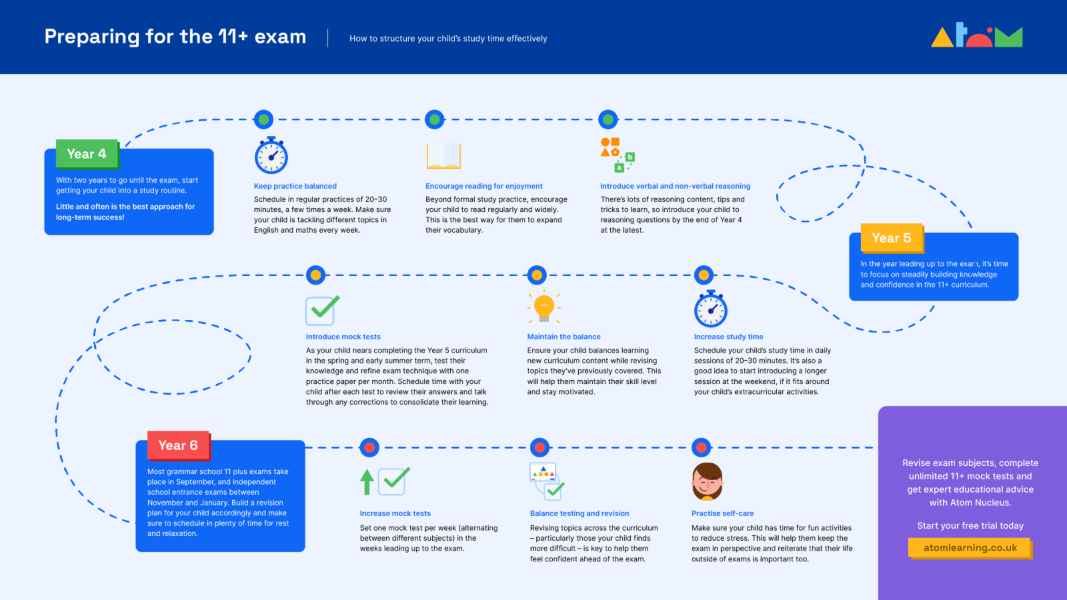
Ten tips for the 11 plus exam
If your child is settling into year 5, as a parent it is time to start thinking about their secondary education.
If you are considering grammar schools or selective independent schools, your child will most likely need to take an entrance exam in autumn 2023 to be eligible for a place.
Known as the 11 plus exam, it is designed to be challenging, identifying pupils whose academic ability places them within the top 25% of their cohort.
Ideally, preparation is needed at least a year in advance, which is why the experts at exam preparation platform Atom Learning have shared 10 top tips for parents to help their child feel confident sitting an 11 plus exam.
10 top tips for parents to help their child feel confident sitting an 11 plus exam.
-
Wider reading
Reading regularly and reading widely is one of the best ways for your child to develop literacy skills.
By reading a variety of different genres and resources, such as fiction and non-fiction books, magazines, news articles etc, this has several benefits.
Not only will it expand their English language vocabulary, improve spelling, grammar and punctuation, but also help them build critical analysis and reading comprehension skills, develop wider imagination, improve concentration and reading speed.
Expert’s top tip: Encourage your child to keep a vocabulary log throughout the next year. For each new word they encounter, they should write it in the log alongside its definition.
-
Set challenges
Studies have found that a lack of challenge is a reason for disengagement in the classroom. Challenges help students develop a personal growth mindset, as well as gives them something to thrive for.
Therefore giving your child a personal target to aim for will encourage and help track progress.
Each month, test your child on their spelling and accuracy of their vocabulary based on the words they have collected in their log.
Expert’s top tip: Always try to set manageable goals, as discouragement could disrupt learning. When your child continues to feel accomplishment with their goals, they will continue wanting to achieve more.
-
Don’t over face
Over facing anyone with workload adds pressure, and young people tend to not always deal with pressure well.
Starting preparation, a year in advance will work in your favour, as you can gradually build skills and not put too much pressure on your child.
For those preparing well in advance, anywhere from an hour a day is a suitable amount of time. Students closer to the exam should scale up their practice to 2-3 hours.
Expert’s top tip: Make sure to also make time for self-care by incorporating fun activities in between study sessions. This will help reduce stress and retirate that there are several other things in their life outside of the exam that are just as important.
-
Keep learning consistent
It is understandable that things like family holidays or illness can interrupt learning schedules.
However, sometimes inconsistent learning can cause students to forget what they have learnt, which can set them a few steps backwards.
Even a little bit of reading for enjoyment, or proactively asking questions whilst in the car can help keep the brain actively thinking about the exam.
Below, the experts share how to structure your child’s study time effectively:
-
Ensure practice is balanced
The subjects that are tested in the 11+ are English, Maths, Verbal Reasoning (VR) and Non-Verbal Reasoning (NVR).
Therefore, it is important to ensure practice is balanced, so you are covering all areas included in the 11 plus exam.
Expert’s top tip: Schedule in regular practices of 20-30 minutes a few times a week which tackles different topics in English and maths every week.
-
Practice exam techniques
For most children, the 11 plus will be the first time they have taken a timed test under exam conditions. Therefore, the next 12 months can be used wisely to help them develop the exam techniques needed to succeed on the big day.
Practice papers are the best way for pupils to learn and improve their exam techniques. Once your child has mastered the curriculum, they can put their knowledge to the test by taking timed practice papers under exam conditions.
Expert’s top tip: Set your child 1 or 2 practice tests each month throughout Year 5, then building up to 1 or 2 per week in the six weeks before their exam. Your child will gradually develop essential time-management skills and they will naturally encounter a range of challenging exam questions, helping them build the confidence to tackle unseen questions on the test day.
-
Consider tuition
Even though tuition is not necessarily a requirement for passing the 11 plus, some children may benefit from the one-to-one support private tutors can offer.
If your child is preparing for a particularly competitive school, a professional tutor may be able to support with preparation for less common tests, such as critical analysis and independent school interviews.
Alternatively, if your child is struggling to understand concepts that you know they will be tested on, or if they are finding it difficult to work through exam questions at the right pace, they may benefit from the support of a private tutor.
Whereas school classes are taught at the pace of the average pupil, one-to-one private tutoring lessons are focused purely on your child's unique learning ability to help accelerate their learning pace and deepen their academic understanding.
Expert’s top tip: Talk with your child first if they would be happy to receive external help. If they don’t feel comfortable receiving help from a tutor, it could upset them can cause stress.
-
Create a safe learning space
Children thrive more when they are comfortable and feel like they have safe place to learn.
Whether it be a particular room in your home, a local library, or with a tutor, ensuring your child feels comfortable and safe whilst learning is extremely important.
It is also important to minimise distractions and differentiate leisure from learning.
Therefore, dedicating an area for learning in your home can be a great way to enhance focus and optimise learning.
Expert’s top tip: Find somewhere with natural light, comfortable furniture and bright colours. All of these elements will provide comfort and encourage learning.
-
Always provide reassurance
Leading up to the last few days before the exam can add extra stress to your child. One of the most effective things parents can do is actively reduce pressure and provide reassurance.
Reassurance will encourage your child to go for it without fear of failure. Parents know their own child best; therefore, it is important to identify feelings of pressure and tension and try to reduce them.
Expert’s top tip: Try talking to them about what will happen if they are not successful, and some children need to know that they won’t be letting their parents down if they are not successful.
-
Never forget to praise
Receiving praise for their progress demonstrates to children that they have the potential to keep on improving their abilities by continuing to apply effort, helping them develop a growth mindset.
Receiving praise only for good results may boost your child's self-esteem in the short term, but it conveys a fixed mindset (the belief that intelligence is fixed and cannot be learnt).
By regularly praising your child's progress, your child will naturally apply more effort to their learning, develop the resilience needed to embrace new challenges, and ultimately find joy in learning for the long term.
Expert’s top tip: 11 plus exam preparation is a marathon, not a sprint – and motivation is key to maintaining momentum over the coming year.
















